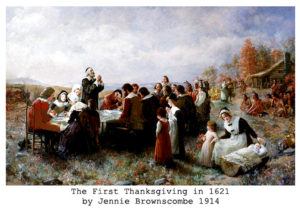Thanksgiving Weekend is ending here in Boston. For the first time in 15 years I spent it in the US with family and friends. It struck me that Thanksgiving is one of the few remaining symbols of common values left in the US. Independence Day, Christmas, New Years and Super Bowl Sunday all have broad appeal, but only Thanksgiving has the single unifying thread of family to keep it above partisan, religious, ethnic, racial and assorted other divisive tendencies within US society.
 Buchanan family Thanksgiving table in The Barn, Holliston, MA.. Photo courtesy Kathy LaCroix Buchanan
Buchanan family Thanksgiving table in The Barn, Holliston, MA.. Photo courtesy Kathy LaCroix Buchanan
Not that all believe Thanksgiving to be controversy-free. Plenty of indigenous people believe that the Pilgrims were complicit in the subjugation and expulsion of eastern tribes from their ancestral lands. The Pilgrims, we may recall, were 40 religious refugees (“Separatists” or “Saints”) who were among the 102 passengers from England who landed first at what became known as Provincetown (on Cape Cod), then Plymouth, Massachusetts (on the mainland) on November 11, 1620 after crossing the Atlantic from the southern English port of Plymouth on the Dutch-made merchant (“fluyt’) ship Mayflower. Originally intending to settle on the Hudson River where an earlier European settlement was already in place, the Pilgrims were thwarted by bad weather and sailing conditions and decided to seek shelter further East. Armed with a grant from the London Company and Crown for the exchange of goods for religious autonomy and self-governance, the Saints/Pilgrims and their fellow travelers were decimated by illness and harsh winter conditions, with only half surviving until the next winter.
Conventional history has it that the Pilgrims arrived in peace and interacted amicably with the native Wampanoag and their sub-tribes (mostly grouped as Alonquian peoples). They also established the Mayflower Compact as the governing framework for the new colony, something that guaranteed all male colonialist participation in collective decision-making and which is considered to be one of the foundations of US democracy. It was in this context that the first shared meal with the local Pokanoket tribe was held in 1621, something that has passed into folklore as Thanksgiving. That meal followed on the heels of the Wampanoag-Pilgrim Peace treaty of April 1, 1621, which bound the settlers and all Wampanoag tribes together against other tribes (such as the Mohawk and Mohegan).

Critical interpretations paint a less rosy picture, noting prior conflict between earlier European settlers and Eastern tribes, with the first shared meal being less an act of cross-cultural friendship than a forced terms of settlement ceremony by which the Pilgrims began a divide-and-conquer process against the indigenous people. Whatever the intent of that breaking of bread, and admitting that colonization did result in the loss of land and displacement of the indigenous majority over the next centuries, “Thanksgiving Day” entered into US mythology as a moment to pause in order to give thanks for the blessings received and ties that bind.
Fast forward to today and one can see that the divide and conquer process is now being used on the settler colonizers in an extremely effective way, yet one that is different to that used on the original indigenous inhabitants. The instrument of division is called “commercialization” and it employs retail therapy as a form of community dismemberment.
For the last decade consumer non-durable retailers have pushed the day after Thanksgiving as “Black Friday,” not so much because it is a deadly day to be avoided but because it is a day for so-called “black” sales of retail goods: everyone gets a heavy discount on whiteware, electronics, toys,clothes and other merchandise so long as they are able to get their hands on the discounted goods. This causes thousands of commodity fetishistic numbskulls to line up 24 hours in advance of opening at assorted malls and other shopping venues in the hope of snagging a 20 dollar 60 inch TV and whatever else is within grasp amongst the grappling hordes. This has caused crushes, riots and a few deaths over the years, but the urge to shop on Black Friday is now reified in the media and popular culture to the extent that the original point of Thanksgiving–to give thanks for family and the benefits at hand–has been replaced by the urge to engage in competitive shopping. This no joke: on Black Friday the retail zombies literally fight each other over bins of discounted goods less than a day after the day of thanks. The media cover the crowded malls and traffic chaos as if they were national celebrations (or disasters, depending on your point of view), with person-in-the-street interviews suggesting that for many the importance of the weekend is the sales, not in spending time with family.

Although the day after Thanksgiving Thursday is not a statutory holiday, it has traditionally been treated as the middle of a long family weekend. Football has been added to the mix, with a range of college “rivalry” games and professional football contests serving as backdrops to the reunions. In recent years it has morphed into Black Friday, which in turn has also become a weekend affair culminating in Cyber Monday: the day in which telecommunications devices are fire-sold, especially via on-line retailers. In fact, on-line sales are rapidly approaching in-store sales, which has prompted shopping outlets such as malls to turn the Thanksgiving weekend into a sales event masquerading as a cultural moment, but without the historical linkage back to 1620. Today it is all about pumpkins, autumn colors, pilgrims and turkeys as caricatures rather than historical legacies, and the vibe is about using Thanksgiving as an icon in order to sell an infinite array of product. Fathers and sons can bond over ride-on lawn mowers and ratchet sets as they undertake autumn outdoor chores; moms and daughters can get their pumpkin baking mojo going together with the latest Martha Stewart oven accessory line. Granddads and grandmas can hug the little ones as they fiddle the consoles of their Pilgrim-themed electronic games.
The commercialization frenzy brought on by Black Friday has not only eclipsed the meaning of Thanksgiving but is in fact just the start of a month-long sales push leading towards Christmas, which in turn is followed by its own returns-and-exchanges day (Boxing Day). The entire month between the two holidays is an orgy of conspicuous consumption and brand tie-ins (to the military, football, Santa Claus and whatever else can entice a purchase). Whatever the spirit of togetherness fostered by the communal offering of thanks in late November, the ensuing four weeks is an exercise is materialist self-gratification.
This extends to petty thieves. The advent of on-line shopping has led to a proliferation of so-called package thefts, whereby thieves follow delivery vehicles around and steal packages from front doorsteps. The distinctive packaging used by Amazon is particularly irresistible to the low-lifes, but the general trend is to let others do the shopping and treat doorsteps deliveries as an invitation to help oneself to the surprises that they contain. Let here be no doubt about it: there is a country-wide epidemic of this type of theft, something that is a microcosmic distillation of how the spirit of Thanksgiving is well and truly gone.
Therein lies the tale. What wars and internal political divisions could not do (even Trump was silent on Thanksgiving Day!), the consumerist mentality and grotesque commercialization of everything has done. It has further broken many of the horizontal solidarity ties that once held communities together and promoted a form of nihilist alienation that is abetted and deepened by the advent of social media and individual telecommunication devices. The result is a society of self-gratifying materialists unconcerned with and unencumbered by the responsibilities of civic engagement.
There are just 2700 Wampanoag left today and they are dependent, as is the case with so many tribes, on gambling for economic sustenance. Things might have been different had they discovered that the best way to undermine the Mayflower Compact and its historical sequels was to push commodities on the white man rather than share a meal and foster community with him.
PS: Here is the RadioLive interview counterpart to this post. It begins with Thanksgiving, then wanders into a range of other subjects:Â http://www.radiolive.co.nz/home/audio/2017/11/-thanksgiving-is-being-degraded-in-the-states—-paul-buchanan.html

Great piece. Saw footage of Melania looking very awkward with the child guests at the White House Thanksgiving celebration.
Thanks Barbara. One unexpected benefit of this prolonged sojourn in the US is my rediscovery of indigenous history. It is a sad one and makes me annoyed that it is not more centrally positioned in the national narrative that is taught in schools.
It is always the victors that write the history books.
It’s the same everywhere.